We are surrounded by machines that are making decisions on our behalf; bits of silicon processing information, determining some state of action based upon some pre-defined set of rules; gates of logic that determine how to proceed based on some virtual interpretation of the reality in which we live.
We can only hope they are doing it right.
I'm reminded of this each and every day as I look at the plethora of devices that are a part of my life and the online networks in which I participate.
But the reality was brought even closer to home when my wife and I recently embarked on a 1,800 km round trip road trip in my Tesla Model 3 and relied on the network of Tesla Superchargers for our journey. The good news is - as any Tesla owner will tell you, the company has done an absolutely brilliant job in creating an infrastructure of reliability with a network that can get you anywhere in North America from Point A to Point B (and doing the same in an increasing number of other regions in the world.) The bad news is that so far, my wife and I are 'data algorithm wimps' - we have not yet developed the ability to place our full trust in the Tesla charging algorithm. Perhaps that is because we are boomers; or perhaps, we are just new to the game of EV algorithmic charging, despite having had the car for almost two years.
Let me explain with an example. Let's say that I want to go from my home to Chicago. I punch in the route, and my Tesla screen will show me a map of my route; where I will stop along the way at a Supercharger in order to 'top up' the battery; and how long it will take at each stop to charge. The screen in the car will show something like this - this is the same same thing, rendered in a 3rd party software program known as A Better Route Planner.

It's all quite logical, and any mature Tesla owner will tell you that it works brilliantly and is completely reliable - as long as you don't exceed the speed and become inefficient, just as you would with a carbon-based vehicle.
And yet my wife and I struggled to trust the algorithm. Our route plan told us that we might arrive at one Supercharger with a 15% battery level, and in our carbon-based minds, we weren't sure we could trust that - what if we were lower? What if we ran out? What if the algorithm was wrong? The result was that our trip ended up involving an excess number of stops, too frequent charging, and more time than we should have. The same thing happened with a recent trip in which we had to grab some gear from our chalet; the algorithm told us we could easily make it there and back on a full battery with the capacity to spare, but we stopped off part way to top up.
Our carbon-based minds kept on rebelling in an electric, battery-based world.
As this was unfolding, I kept running through my mind that what we were going through was an exercise in how well we might trust the algorithm. Clearly, we weren't quite ready. And there is no doubt that we are surrounded by similar algorithms - thermostats that control our AC, medical devices which interpret our health data, and social networks that programmatically feed us information based on some unforeseen and potentially misused set of rules.
Everywhere we turn and everywhere we go, we are surrounded by little machines doing the work and making decisions on our behalf - and a unique part of life in the 21st century has to do with the question - how well do we trust them?
And that question is only to become more frequent - and more challenging - as we go full-speed ahead into the world of generative AI, large language models, and other algorithmic technologies.
Welcome, to the 21st century - a time of all algorithms, all the time!
Futurist Jim Carroll spends a lot of time thinking about things while doing things. An 1,800 km journey in his Tesla gave him a lot of time to think about things.
Thank you for reading Jim Carroll's Daily Inspiration. This post is public so feel free to share it.

